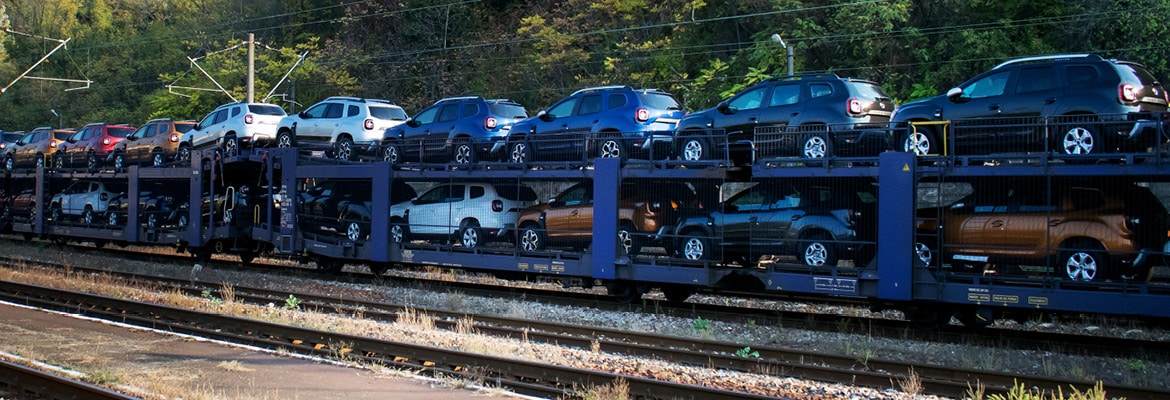Author(s)
The rail industry is currently facing a major train car shortage. Delays stemming from this shortage spell trouble for businesses reliant on swift and efficient rail transportation. Automotive manufacturers, tasked with getting new vehicles from production lines to showrooms, are particularly feeling the pinch.
Causes of the rail car shortage
In recent years, automotive manufacturers have weathered many storms in supplying cars to dealerships. One unforeseen hurdle? A severe lack of rail cars for transport. This shortage arises from various factors—a quick rebound from the microchip shortage, a booming e-commerce sector and logistics disruptions due to adverse weather conditions. The ripple effect on the auto industry is substantial.
As manufacturers grapple with these issues, we anticipate adaptations and innovations to emerge in response to a shifting transportation landscape.
Impact of the supply chain disruption on dealerships
Manufacturers are struggling to transport new vehicles to dealerships nationwide, creating a bottleneck effect. This delay is frustrating for consumers eagerly waiting for their new car and hinders the industry’s growth as a whole.
According to a report from the Detroit Free Press, about 70,000 new cars are waiting to be shipped to dealers. In a country that builds over eight million cars each year, this shortage could become a monumental problem. Ford Motor Co. and General Motors have been significantly impacted, as reported by multiple sources.
However, despite the challenges, the industry is actively seeking solutions to overcome this obstacle and ensure the timely delivery of new vehicles to dealers and customers.
Combatting the train car shortage: strategies and solutions
While BNSF Railway Co. is ramping up efforts in response to the surging demand for new cars, the relief may not be felt for several months. In the meantime, FordAuthority.com reports that automakers have already reduced their production schedules by at least 50,000 vehicles, which could impact deliveries to dealers and customers.
Production delays can be frustrating for any company, especially when they are caused by factors outside of their control, such as a shortage of train cars. However, some strategies can be implemented to help manage these delays and minimize their impact.
One effective approach is communicating regularly with suppliers and customers, keeping them informed of potential delays and working together to find alternative solutions. Additionally, optimizing production schedules and planning for contingencies can minimize disruptions. Another tactic is considering alternative transportation methods.
Mike Trudeau, Executive Vice President of Business Development at Montway Auto Transport, offers an insightful perspective on the situation. “Manufacturers transport thousands of vehicles from the factory to dealerships monthly and depend on ports and rail yards. With the possible shortage of rail cars, manufacturers may have to consider more over-the-road transportation.”
Harnessing technology to reduce supply chain risk
Real-time tracking and automated inventory management systems, like the Montway Automaton Portal (M.A.P.), enable tracking from the factory to the dealer or end customer. Moreover, predictive analytics based on machine learning algorithms help logistics managers identify potential bottlenecks and make data-driven decisions to optimize transport routes and modes.
Overall, it is clear that the train car shortage and its impact on the auto industry will remain a challenge for some time. Despite this difficulty, dealerships must rely on identifying inventive solutions to address delivery delays and ensure that dealers are able to maintain satisfactory inventory levels.
The way forward
The train car shortage will continue to challenge the auto industry. Despite this, dealerships must identify inventive solutions to address delivery delays and maintain satisfactory inventory levels. Adaptable shipping methods, like Over-The-Road (OTR) transportation, can expedite getting new vehicles to their end destination. Additionally, technologies like predictive analytics help automakers and dealerships anticipate supply chain performance disruptions. While these strategies may not completely resolve the railcar shortage, they can certainly mitigate its impact across the entire automotive industry.

About Montway Auto Transport
Montway Auto Transport has a carrier network of over 15,000 available in all 50 states. As one of the leading logistics providers in the nation, dealerships can rely on our experience to move inventory across the state or the country with speed and reliability. Visit Montway.com/Logistics or call 888-998-4161 to learn more.







